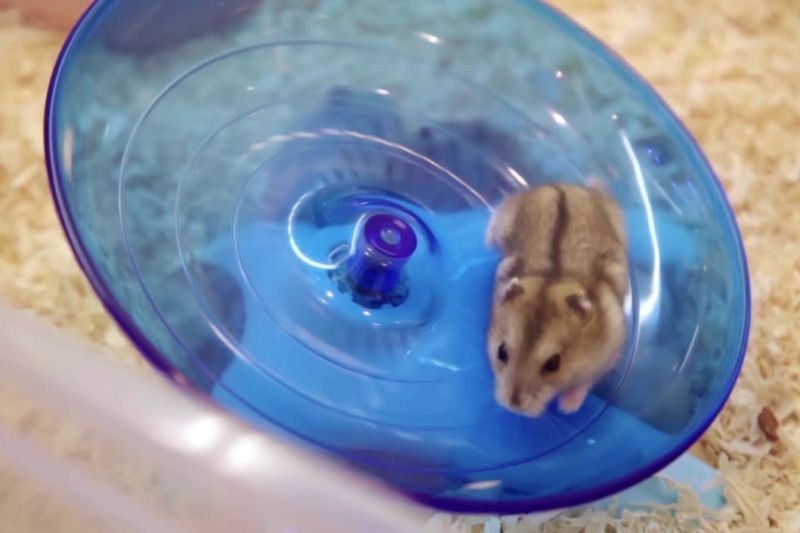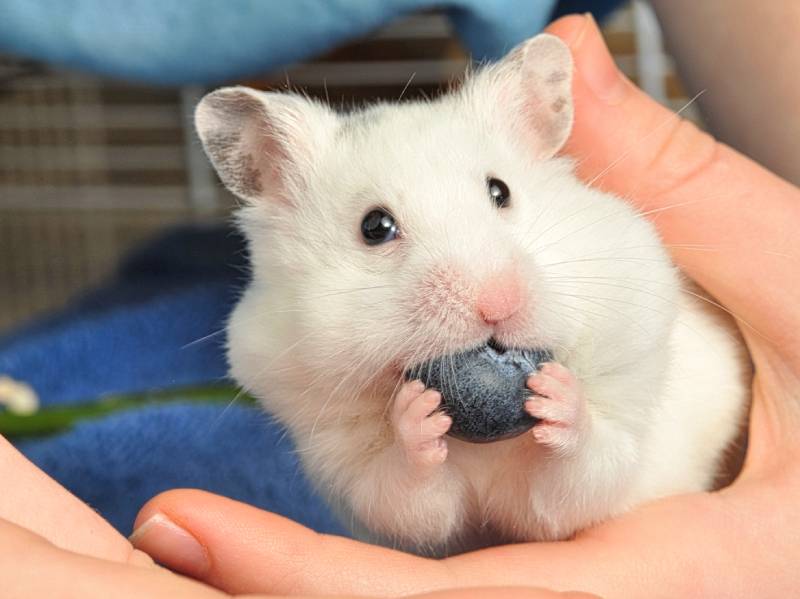As a proud hamster owner, I’ve always been curious about what I can feed my furry little friend. One day, as I was enjoying a fresh bowl of blueberries for myself, a question popped into my mind: “Can hamsters eat blueberries?”
Intrigued by this thought, I decided to do some research to ensure that I was providing the best possible care for my beloved pet.
My journey to find out whether this fruit was a suitable snack for my pet led me down a path of discovery about hamster nutrition and dietary preferences. Along the way, I stumbled upon some fascinating information that I can’t wait to share with you.
So, if you’re curious about what your pocket-sized pet can nibble on, let’s start right away.
Are Blueberries Safe for Hamsters?
The short answer is yes, hamsters can eat blueberries. However, like with any treat, there are some considerations to keep in mind to ensure the health and safety of your pet.

How to Serve the Fruit?
Introducing fruits like blueberries to your hamster’s diet can be a delightful experience for both you and your pet. However, the manner in which these fruits are served plays a pivotal role in ensuring the safety and enjoyment of the treat.
Portion Size and Frequency
Hamsters, despite their voracious appetites, have tiny stomachs. This means that even a small amount of a new food can have a significant impact on their diet and health.
A hamster’s stomach is roughly the size of a marble. With this in mind, even half a blueberry can be quite filling for them. It’s crucial to remember this when introducing any new food to their diet.
Regulating Frequency
While it might be tempting to offer these juicy treats more often, especially when your hamster seems to love them, restraint is key. Offering blueberries once every 7-10 days is a good rule of thumb.
This ensures they get the benefits of the fruit without overloading on sugar or upsetting the balance of their primary diet.
Preparation Tips
The way blueberries are prepared can make a difference in how safe and beneficial they are for your hamster.
Opt for organic fruit whenever possible. These are free from harmful pesticides and chemicals that could be detrimental to your hamster’s health. If organic options are unavailable, ensure you wash non-organic blueberries even more thoroughly.
Washing and Serving

Rinse the blueberries under cold running water to remove any residues. You can use a soft brush or your fingers to gently scrub the surface. Depending on your hamster’s preference, you can serve the fruit whole, halved, or mashed.
Some hamsters enjoy the challenge of a whole blueberry, while others might find it easier to consume when it’s mashed.
Post-Feeding Care
It’s essential to monitor your hamster after introducing any new food. Look for signs of enjoyment or any adverse reactions. After a few hours, ensure you remove any uneaten blueberries from their cage.
This prevents the fruit from becoming a breeding ground for bacteria, which could harm your pet.
Why Should You Include Them In Your Pet’s Diet?

When introduced appropriately, this fruit can be more than just a tasty treat for hamsters. They offer a range of health benefits that can enhance the well-being of these small creatures.
-
Rich in Essential Nutrients
Blueberries are packed with vitamins, especially vitamins C and K. These vitamins play a pivotal role in bone health, blood clotting, and immune function. Regular intake of vitamin C can help in collagen formation, which is essential for wound healing.
| Nutrient | Amount (per 100g) | Benefits for Hamsters |
|---|---|---|
| Vitamin C | 9.7 mg | – Supports immune function – Aids in collagen synthesis – Helps in the absorption of iron |
| Vitamin K | 19.3 µg | – Important for blood clotting – Supports bone health |
| Vitamin E | 0.57 mg | – Acts as an antioxidant – Supports skin health |
| Manganese | 0.336 mg | – Supports enzyme function – Aids in bone formation |
| Fiber | 2.4 g | – Aids in digestion – Helps maintain healthy gut function |
| Antioxidants (e.g., anthocyanins) | Various compounds | – Protects cells from oxidative damage – Supports overall health |
-
Antioxidant Powerhouse
Blueberries are renowned for their high antioxidant content. Antioxidants combat free radicals in the body, which can cause cellular damage. For hamsters, this could mean better resistance against diseases and potentially a longer, healthier life.
Potential Concerns
While this fruit has its benefits, it’s essential to be aware of potential concerns to ensure your hamster’s safety.
1. Digestive Issues
Hamsters have sensitive digestive systems. While they can process blueberries, an excessive amount can lead to diarrhea or an upset stomach. It’s crucial to monitor your hamster after introducing any new food to ensure they don’t show signs of discomfort.
2. Pesticides and Chemicals
Blueberries, like many other fruits, can be treated with pesticides and chemicals. These can be harmful to hamsters. Always opt for organic fruit when possible.
If organic isn’t an option, wash the berries thoroughly under running water, rubbing them gently between your fingers to remove any residues.
3. Sugar Content
While the natural sugars in blueberries can provide a quick energy boost, too much sugar can be detrimental. Hamsters are prone to diabetes, and a high sugar intake can increase the risk.
It’s essential to balance their diet and ensure that sugary treats, including fruits, are given in moderation.
FAQs
Can hamsters have blueberry leaves or stems?
It’s best to avoid blueberry leaves or stems. While the fruit itself is safe, the leaves and stems might not be digestible and could potentially contain substances that are not ideal for hamsters.
How should I store blueberries intended for my hamster?
Store them in the refrigerator to keep them fresh. Before serving them to your hamster, bring them to room temperature, as cold foods can be a shock to their system.
Can I give my hamster blueberry juice or blueberry-flavored treats?
It’s advisable to avoid blueberry juice or flavored treats. These often contain added sugars, preservatives, or artificial flavors that aren’t suitable for hamsters. Stick to fresh blueberries for a natural and safe treat.
Are dried blueberries safe for hamsters?
Dried blueberries are more concentrated in sugar than their fresh counterparts. If you choose to give them, ensure they don’t have added sugars or preservatives and offer them in even smaller quantities than fresh ones.
Can I mix them with other fruits?
While it’s okay to offer a mix of safe fruits occasionally, it’s essential to ensure the total quantity remains small. Also, introducing one fruit at a time helps monitor for any adverse reactions.
The Bottom Line
In conclusion, yes, hamsters can eat blueberries. But as pet owners, it’s our duty to ensure that this treat remains a healthy indulgence, rather than an inadvertent risk. Here’s to many more moments of joy with our furry friends, one tiny blueberry at a time!

